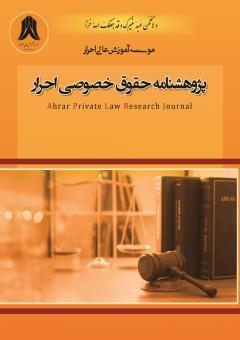Draft of the 25-year Comprehensive Cooperation Plan between Iran, China and its Benefits and Shares with the Principle of Denying Sabotage.
Subject Areas : Islamic jurisprudenceHadi Abangah azgomi 1 , Milad Ramezanin 2 , Erfan Yousefi qale roudkhani 3
1 - PhD in Jurisprudence and Fundamentals of Islamic Law, Department of Theology, Jurisprudence and Fundamentals of Law, Faculty of Law, Central Tehran Branch, Islamic Azad University, Tehran, Iran.
2 - Bachelor's student of theological education, Department of Islamic Jurisprudence and Law, Imam Ali (AS) campus branch, Farhangian University, Rasht, Iran.
3 - Bachelor's student of theological education, Department of Islamic Jurisprudence and Law, Imam Ali (AS) campus branch, Farhangian University, Rasht, Iran.
Keywords: Negation of the path, Iran-China agreement, draft, international relations,
Abstract :
The principle of "negation of the path" is one of the most important principles in Islamic jurisprudence, which has numerous applications in jurisprudence, politics, and governance. This principle is based on Quranic verses, such as verse 141 of Surah An-Nisa, the famous prophetic hadith "Islam prevails and is not prevailed upon," and the consensus of scholars. One of the practical applications of this principle is that regulating relations between Muslims and non-Muslim nations should always prioritize the legal rights of Muslims over non-Muslims. The Islamic Republic of Iran, which has established its government based on Islamic jurisprudence, has been striving in recent years to prove its religious, political, and economic independence and not sign any agreements contrary to Islamic law, jurisprudence, and the country's interests. However, some scholars and politicians challenge this principle of jurisprudence regarding the signing of the 25-year cooperation agreement between Iran and China. Some believe that implementing this agreement goes against Islamic jurisprudence and the country's interests, while others believe that it does not violate the principle of "negation of the path" and is in the country's best interests. Therefore, this article aims to describe and compare the advantages and disadvantages of this agreement with Islamic jurisprudence, the principle of "negation of the path," and the country's interests using a descriptive method.
1. Ibn Arabi, M.(1987). Ahkam al-Quran (by Ibn Arabi), four volumes, Beirut, Dar al-Jeel, first edition.
2. Bajnouri, M. (1981), Al-Qawaid al-Fiqhiyah, Qom: Nashr al-Hawi. [In Persian]
3. Bajnouri, S H (1998), Al-Qawaid al-Fiqhiyah (by Bajnouri, Sayyid Hasan), seven volumes, Qom, Nashr al-Hadi, first edition. [In Persian]
4. Khomeini, S R(2000), Kitab al-Buyu' (by Imam Khomeini), five volumes, Tehran, Institute for Compilation and Publication of Imam Khomeini's Works, first edition. [In Persian]
5. Raghhib Isfahani, H (19), Mufradat al-Faz al-Quran, one volume, Lebanon-Syria, Dar al-Alam, Dar al-Shamiyah, first edition.
6. Sheikh Tusi ,A. (no date).Al-Tibyan fi Tafsir al-Quran, ten volumes, Beirut, Dar Ihya al-Turath al-Arabi, first edition.
7. Sheikh Saduq M(1992), Man La Yahduruhu al-Faqih, four volumes, Qom, Islamic Publications Office affiliated with the Society of Seminary Teachers, second edition. [In Persian]
8. Tabarsi, F.(1993). Majma al-Bayan fi Tafsir al-Quran, ten volumes, Tehran, Naser Khosrow, third edition. [In Persian]
9. Maraghi,M. (1996). Al-Anawin al-Fiqhiyah, two volumes, Qom, Islamic Publications Office affiliated with the Society of Seminary Teachers, first edition. [In Persian]
10. Najafi, S M .(1981).Jawahir al-Kalam fi Sharh Sharayi al-Islam, vol. 41, Tehran: Dar al-Kotob al-Islamiyah. [In Persian]
11. Beestoni, M.(2003).Tafsir-e-Javan, Beyan-e-Javan Publications, Tehran, third edition. [In Persian]
12. Ja'farian, R. (2007).Political History of Islam (The Life of the Prophet Muhammad), Delil-e-Ma'a Publications, Qom, seventh edition. [In Persian]
13. Haqiqat, S S.(1997). Responsibilities of the Islamic Government, Tehran, Nashr-e-Motalle'at-e-Rahbari. [In Persian]
14. Haqiqat, M .(2008). Principles of Islamic Political Thought, Tehran, Samt Publications. [In Persian]
15. Zarrinkoub, A.(1995). Karnameh-e-Islam, Amir Kabir Publications, Tehran, fourth edition. [In Persian]
16. Shokouhi, A. (1988).Islamic Political Jurisprudence, Qom, Islamic Propagation Office. [In Persian]
17. Ghaffari, M. (1999).Principles of Diplomacy in Islam and the Behavior of the Prophet, Tehran, Nashr-e-Mohajer. [In Persian]
18. Fattahi, A. (2020). "Developing Relations with Beijing is the Only Way for the Country's Progress in Current Conditions", Iranian Diplomacy Website, April 2021. [In Persian]
19. Faiz, A. (1999).Principles of Jurisprudence and Principles, Tehran University Press, Tehran, tenth edition. [In Persian]
20. Kalantari, A. (1999), Secondary Judgment in Islamic Legislation, Islamic Propagation Office, Qom, first edition. [In Persian]
21. Motahhari, M.(1991). Islam and the Demands of the Time, Sadra Publications, Tehran, eleventh edition. [In Persian]
22. Motahhari, M. (2006), A Journey in the Life of the Prophet, Sadra Publications, Tehran, thirty-third edition. [In Persian]
23. Makarem Shirazi, N. (2003), Tafsir-e-Nemooneh, Dar al-Kotob al-Islamiyah Publishing, Tehran, second edition. [In Persian]
24. Makarem Shirazi, N(2007), Shia Answers, Imam Ali ibn Abi Talib School Publications, Qom, third edition. [In Persian]
25. Nou'i, Gh. (2011).Dealing with Opponents in the Quran and Sunnah, Ketab-e-Mobin Publications, Rasht, first edition. [In Persian]


